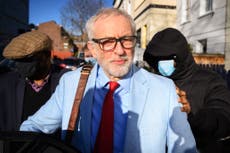Corbyn’s Labour suspension ‘went behind agreement to reinstate’ him, High Court told
Lawyers argue party went against ‘legitimate and final decision’ of its ruling body

Your support helps us to tell the story
From reproductive rights to climate change to Big Tech, The Independent is on the ground when the story is developing. Whether it's investigating the financials of Elon Musk's pro-Trump PAC or producing our latest documentary, 'The A Word', which shines a light on the American women fighting for reproductive rights, we know how important it is to parse out the facts from the messaging.
At such a critical moment in US history, we need reporters on the ground. Your donation allows us to keep sending journalists to speak to both sides of the story.
The Independent is trusted by Americans across the entire political spectrum. And unlike many other quality news outlets, we choose not to lock Americans out of our reporting and analysis with paywalls. We believe quality journalism should be available to everyone, paid for by those who can afford it.
Your support makes all the difference.Jeremy Corbyn’s suspension from the parliamentary Labour Party “went behind an agreement to reinstate” him “at all levels”, the High Court has heard.
At a remote hearing on Monday, the former leader of the opposition’s legal team said he was considering legal action against Labour for “an injunction to restore the whip immediately”.
Mr Corbyn was suspended in October after claiming antisemitism in the party had been “dramatically overstated for political reasons”.
Despite being reinstated as a party member by the National Executive Committee (NEC) three weeks after his suspension, Mr Corbyn’s successor Sir Keir Starmer blocked him from sitting as a Labour MP – accusing him of “undermining” work to restore trust and confidence in Labour’s ability to tackle antisemitism.
Speaking earlier before the hearing, Sir Keir told reporters he was “not going to comment on [this] particular case”.
“I don’t want to see the Labour Party tied up in court proceedings, I want to see the Labour Party out there campaigning,” he said.
Mr Corbyn, the MP for Islington North, later clarified his comments in a statement, which he insists was agreed with Labour, saying concerns about antisemitism were “neither ‘exaggerated’ nor ‘overstated’”.
His legal team is now applying for “pre-action disclosure” from the Labour Party ahead of an “anticipated claim” over his suspension.
On Monday, Mr Corbyn’s barrister, Christopher Jacobs, told Judge Lisa Sullivan: “We need to know the involvement of the Labour Party leader [Sir Keir] in accepting the NEC decision.
“We need to know the conduct of the Labour Party leader in accepting the agreement [that there would be] no requirement for further sanction and the matter would be closed. And we need to know the extent to which the decision to impose a second suspension ... was influenced by third-party interventions.”
Calling Labour’s treatment of his client “grossly unfair”, Mr Jacobs said the decision to prevent his client returning legitimately to the party seemed to be the result of “political interference”.
Mr Jacobs argued “the party and the party leadership in particular” went behind “the legitimate and final decision of the NEC” to reinstate Mr Corbyn, arguing that its “complete about-turn is perverse”.
He also argued that the suspension of Mr Corbyn – who was due to attend the hearing on Monday – from Labour was “a fundamental breach of contract” in relation to his client’s membership of the party.
Mr Jacobs told the court that Labour had breached a “settled agreement” to restore the party whip to Mr Corbyn and that, at two separate meetings in November, “it was agreed that there would be no further sanction imposed in respect of my client”.
Rachel Crasnow QC, for Labour, said the party had already provided “adequate disclosure”, adding: “There was no agreement in any event.”
She said Mr Corbyn’s proposed claim against Labour was “a straightforward contract claim based on two agreements: firstly, his membership of the party ... and, secondly, upon a supposed agreement reached between his representatives and party representatives”.
She added that disclosure was also unlikely to resolve the dispute without the need to bring legal proceedings because “this case has an important political significance to Mr Corbyn that will not be satiated by obtaining early disclosure”.
Once both sides were finished, Judge Sullivan said she would give her ruling on Mr Corbyn’s application “as soon as I can”. There has been no indication yet as to how long the process might take.
Even if the pre-action disclosure application is unsuccessful, though, a case is expected to go ahead on the basis of the claim that the second whip suspension was not procedurally fair, according to reports by LabourList.
Additional reporting by PA


Join our commenting forum
Join thought-provoking conversations, follow other Independent readers and see their replies
Comments